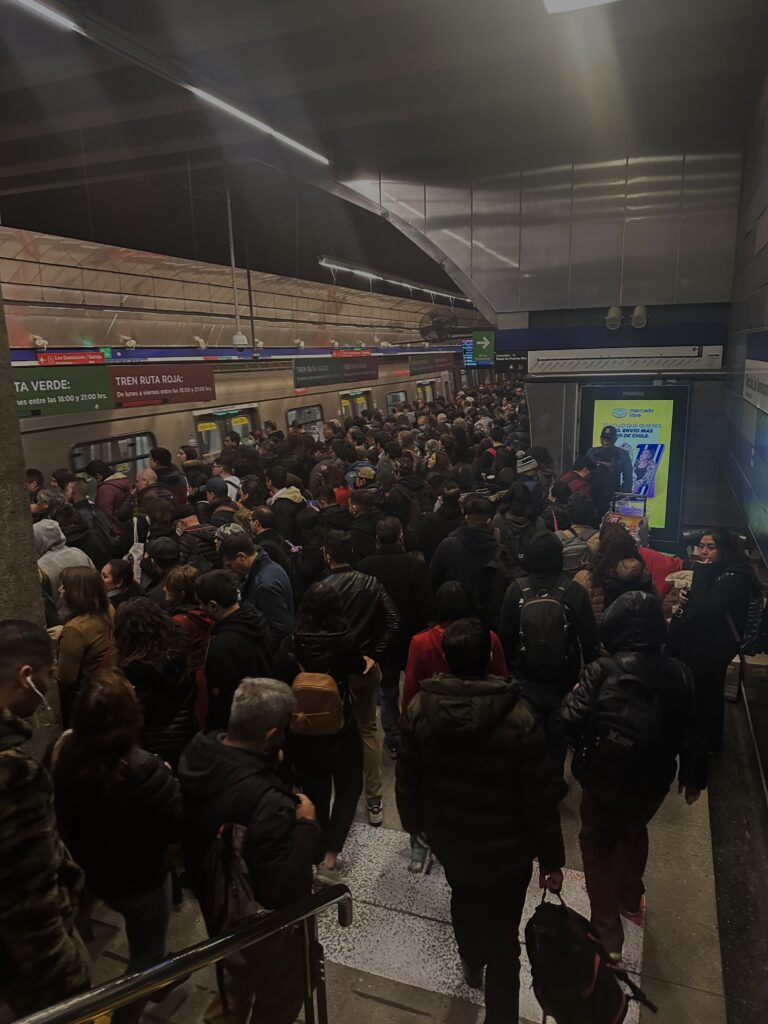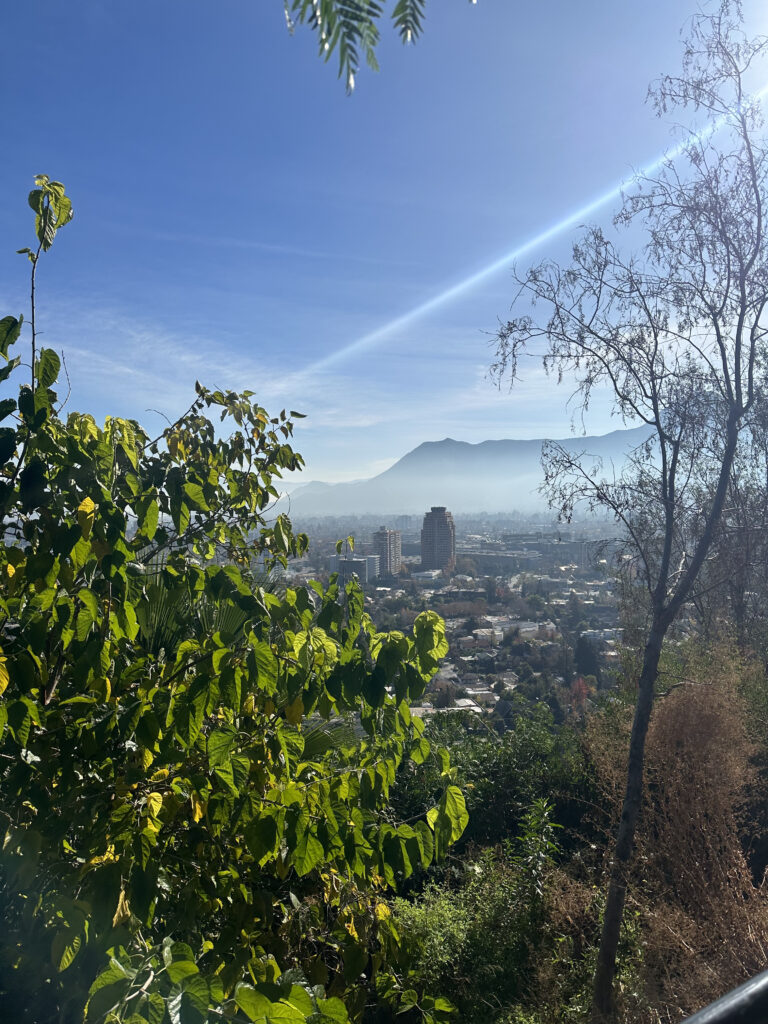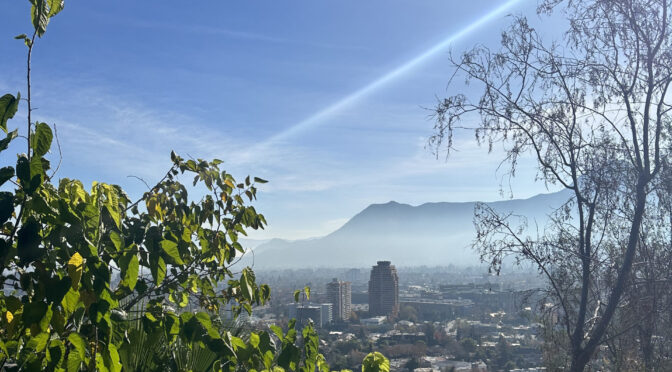By Alejandra Jimenez, Undergraduate student in the UT Government Department
Surrealism refers to a form of visual art that produces incongruous imagery by means of irrational juxtapositions. Some argue that surrealism revolutionizes the human experience, as magic and beauty can be found in the unexpected and uncanny. In a similar way, my time in Chile has been just that—pleasantly unexpected.
To illustrate, consider the following scenario: You are at a meeting with an academic expert in constitutional theory, a meeting combining the use of Chilean idioms, history, extremely fast-paced talking, and technical material on Chile’s constituent process. You leave the meeting feeling brain-dead yet accomplished, as you managed to understand at least half of what was said.
The meeting’s over and your colleague advises you to order an Uber (it is 6 PM and rush hour).
As if!
You walk down the steps into La Moneda station, your body aching with immediate regret at not taking that good Uber advice. How could you, a self-proclaimed local, get it wrong? Anyway, you can’t go back up now as you will become human MUSH. “I got this,” you think to yourself. Truth is, you don’t. You wait for the second train, the third train, the fourth train. Nothing changes. You are stuck. And you’re claustrophobic so that doesn’t help. At last, you muster up the courage to enter the train from hell.
You become a sardine.
When you think your day couldn’t get better, in comes the sporadic metro vendors trying to sell packets of Vitamin C.
The placebo effect.
One of them shouts straight into your ear. Then enters the violinist taking up four bodies worth of space to play the Game of Thrones theme song. You want out.
You inevitably make it out of the train—your body whole yet feeling the slightest bit manic.
At this point, you may be thinking this sounds horrible.
It was.
Truly, public transportation had always been my biggest fear about entering a new country. But as the weeks passed, and my experience as a commuter broadened—and humbled me—I learned to enjoy the metro. Of course, now I know when it’s best not to take it, but overall, it has been a huge learning experience.

Speaking of learning experiences, working with International IDEA has been a top one. My work has centered around an agreement made between IDEA and the European Union that aims to support the Chilean parliament during its ongoing constitutional reform process. This project asks that my fellow interns and I focus on certain topics that Congress itself considers significant for Chile’s new political cycle—my topics being civic participation, transparency, and innovation.
My first task was to summarize the legislative status of my assigned subjects. To do this, I reviewed laws that have been adopted or are under consideration in either the Chamber of Deputies or Senate. This allows us to see which themes are being given priority by Congress and which are not. Currently, I am working on a press review to explore the broader context of these legislative issues. This grants the opportunity to evaluate the public’s interpretation of the matters under analysis. Working on these tasks has allowed me to 1. perfect my reading and writing skills in Spanish, and 2. gain deeper insight into the type of laws that are of most relevance during this period of Chile’s political cycle.
During my time working in the Chile office, the conversations I have held with my supervisors have also allowed me to learn more about Chile’s history and the debates that continue to either unite or polarize the country. But beyond the political realm, such conversations have allowed me to form close connections with the people I work with, along with being granted an insight into their lives as Chileans.
Working with IDEA has also opened the door to networking and academic opportunities. These opportunities have consisted of meetings with academic experts—one of which I alluded to above—and a seminar with the Center for Public Studies (CEP Chile). The seminar included experts from around the world and members from both the Expert Commission drafting the new constitution and the Constitutional Council that will approve the final constitution, all gathered for a comparative discussion on the contents of Chile’s draft constitution. Attending this seminar brings me back to the theme of surrealism, as I could not believe I’d ever be listening to scholars whose articles I had spent the past year reading. Such people included Gabriel Negretto, David Landau, Adam Chilton, and Lisa Hilbink, among others. Getting the chance to listen to members of the Constitutional Council voice their opinions on what they deemed as sufficient and insufficient from the draft constitution was also fascinating.

When I refer to my time in Chile as surrealist, I think about experiencing two things you wouldn’t expect to be in the same environment—a fantasy theme song playing in a metro while surrounded by people clad in business attire; scribbles of political statements from 2019’s Estallido Social on bathroom walls in a Lastarria restaurant while ABBA’s Mamma Mia plays in the background; a man pushing a grocery cart full of carrots and red peppers deep inside downtown Santiago while a third-year undergraduate student sits in front of a panel of scholars discussing what works and doesn’t work about the constitution. Could it be that I may be over-romanticizing my experience? Duh, I’m twenty. But the knowledge I have gained and the joy I have felt from these encounters is undeniable. Ultimately, my time living, working, and commuting in Chile has been and felt unreal, and I cannot wait for what’s to come.

